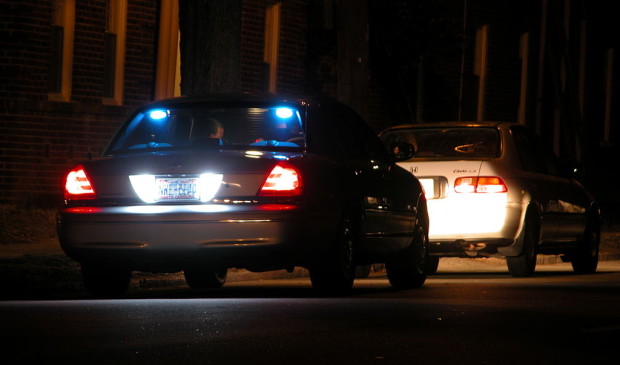Commission debates racial disparities in policing
Wednesday, April 6, 2016 by
Jack Craver The Austin Police Department “deserves at least a B+,” according to Austin Police Monitor Margo Frasier.
The good news is that not only did the total number of complaints about APD decline in 2014, but the most common complaint was for officer rudeness, Frasier told the Public Safety Commission on Monday. During her presentation, she discussed the implications of a report her office put out last month regarding complaints made against police officers as well as racial disparities in enforcement.
It is important that officers are polite, said Frasier, but “there are worse things for people to complain about.”
Nevertheless, racial disparities persist on a number of measures. While African-Americans make up only 8 percent of Austin’s adult population, they made up 26 percent of the total complaints lodged against officers. In contrast, whites account for roughly 50 percent of the population but only 35 percent of complaints; Latinos account for 35 percent of the population but only 21 percent of complaints.
The disparities are smaller when it comes to traffic stops, although blacks are still over-represented at 12 percent of all stops.
Frasier noted the relatively low number of complaints from Latinos and said her office has sought, through outreach, to make clear to immigrants that filing a complaint will not result in scrutiny of their immigration status.
The police monitor further urged the department to improve its reporting and analysis of traffic stops by including stops in which no arrest or citation takes place. She also recommended that her office and the department regularly audit videos of traffic stops to ensure that racial data is being accurately reported and, similarly, that both her office and the department should audit “response to resistance” reports. In addition, Frasier suggested that the department take “greater care” before dismissing complaints as meritless.
The commission postponed action on a resolution proposed by Vice Chair Rebecca Webber that would have recommended implementation of most of the monitor’s recommendations. The item was postponed in light of both scheduling conflicts and concerns raised by the police department that the authority the monitor requested for itself to audit traffic stop videos as well as “response to resistance” claims would conflict with the meet-and-confer agreement between the city and the police union.
Although most commissioners did not comment on the presentation, those who did offered plenty of criticism of Frasier’s conclusions.
“The report left a lot to be desired,” Commission Chair Kim Rossmo later told the Austin Monitor.
Rossmo, a former police officer, said that there was crucial context missing from the report that could give insight into whether African-Americans and Latinos were being stopped more often as a result of bias or because officers are more likely to be present in high-crime areas, which have higher minority populations.
That was the hypothesis put forward by Brian Manley, APD chief of staff for Police Chief Art Acevedo.
“Crime does tend to cluster in some of the lower socio-economic neighborhoods, and we do see minority populations over-represented in those communities, and therefore the likelihood of interacting with officers is increased,” he said.
One way to try to more precisely identify bias, said Rossmo, would be for the department to conduct a “veil of darkness” study, in which the demographic profile of drivers stopped at night is compared to that of drivers pulled over during the day, based on the assumption that officers are less likely to perceive the race of a driver at night and therefore less likely to allow bias to enter into their decisions.
“If you can figure out a way in the city of Austin to have the resources to do those things, I’d be glad,” said Frasier, right before being cut off by Rossmo.
“Actually, I kind of think that’s your job,” he said.
Commissioner Michael Levy was more forgiving in his remarks and made sure to congratulate Frasier on the report. His concern, he said, was that the tone of the report was more negative than its findings.
“This is a very positive report. We’re going in the right direction,” he said.
Levy worried that a report that might be too negative in tone would send the message to prospective officers that the city has an adversarial relationship with its police force.
Manley was happy to report in his own presentation, which included figures from 2015, that Austin police have largely abandoned the practice of searching cars without probable cause. In the past, if an officer had a hunch about something but there was otherwise no evidence that would authorize a search of the vehicle, the officer would often request permission from the driver to search the car. Now, police are not barred from doing this, but they must also request permission from their sergeant as well as get the driver to sign a form authorizing the search. Due to a policy change in 2011, such “consent searches” declined from roughly 1,200 in 2010 to only 63 last year.
“We really narrowed down the ability for officers to engage in consent searches, because of the mistrust it can create in the community,” explained Manley.
By Ildar Sagdejev (Specious) (Own work) [GFDL or CC BY-SA 4.0-3.0-2.5-2.0-1.0], via Wikimedia Commons.
You're a community leader
And we’re honored you look to us for serious, in-depth news. You know a strong community needs local and dedicated watchdog reporting. We’re here for you and that won’t change. Now will you take the powerful next step and support our nonprofit news organization?









